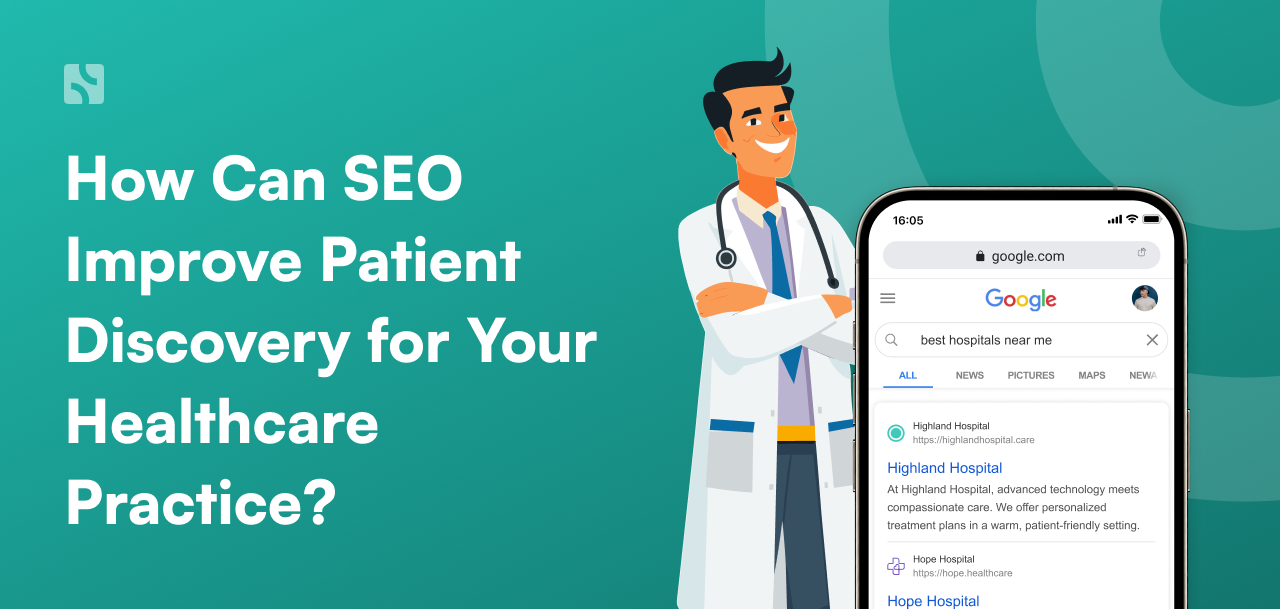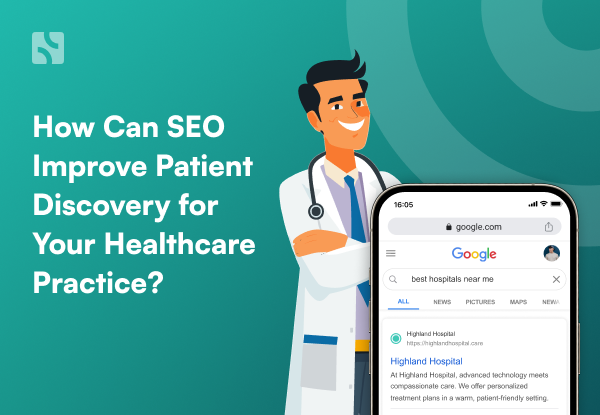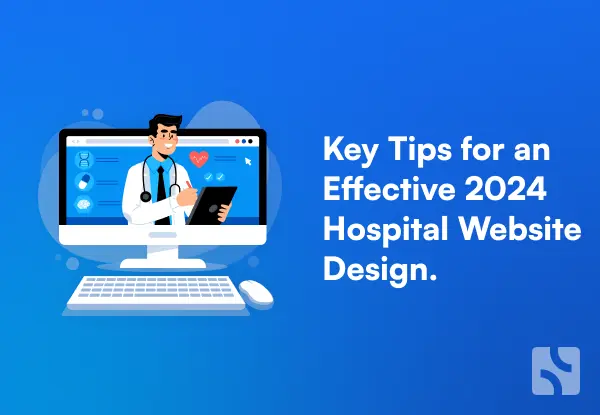SEO for Medical Practices: Expanding Patients Reach

Is your medical practice aiming to attract more patients? If you are looking for it, then this blog is for you. In today’s digital age, patients no longer rely on word of mouth or local directories to find a medical practice. People use Google to search for healthcare providers, check reviews, and book appointments. If your clinic or hospital doesn’t appear on the first page of search results, you’re missing out on a huge opportunity to attract new patients. That’s where Search Engine Optimization (SEO) comes in to improve the ranking of medical websites. Let’s discuss why SEO is crucial for medical practices.
SEO practices are not only about ranking on search engine result pages (SERP) but also about reaching out to potential customers who are looking for you. You can rank your medical website on SERP by optimizing keywords related to your services and field. With a proper SEO strategy, your website can outshine the competitors and bring more traffic and patients to your clinic or hospital. The main goal of SEO is to reach out to people looking for healthcare services. SEO is the most effective way to improve online visibility and grow your medical practice.
Why is SEO important for medical practices?
SEO is best for improving the online visibility of your site. If you are not visible on the public’s screen, you are missing out on potential customers. It doesn’t mean the referrals are not important, but nowadays everyone is searching online to look for nearby medical practice and the best one. So, it is necessary to implement proper SEO strategies to put your practice in front of prospects. This will help you increase your audience reach and rank for related services you provide in your local area and nearby cities.
Also, Read our other blog for your website growth and User Experience: Designing a Hospital Website
Key benefits of SEO for your medical practice

1. Improved Online Visibility and Attract Patients
When potential patients search for medical services in your area, appearing on the first page of Google or other search engines is essential. Most users don’t look beyond the first page of search results, and around 68% of searchers click on the first 5 results, meaning you’re practically invisible if your clinic isn’t there. Accordingly, you have to improve your visibility to be seen by patients. SEO helps you optimize your website with relevant keywords, quality content, and technical elements that boost your ranking on search engines. By improving your online visibility, you’re making it easier for potential patients to find you.
2. Attracting Local Patients Through Local SEO
For medical practices, local SEO is a game-changer. Local SEO focuses on optimizing your online presence to attract patients from your geographical area. Near-me keywords play a big role in local SEO. This includes optimizing your Google My Business profile, encouraging positive patient reviews, and using local keywords. When someone searches for a “dentist near me” or “cardiologist in [city],” a well-optimized local SEO strategy ensures your clinic or hospital appears in the local search results, map packs, and directories. This makes your clinic more accessible to people seeking healthcare in your area, driving more footfalls to your clinic or hospital.
3. Building Trust and Credibility
Patients tend to trust names that appear at the top of search results. When your website ranks high, it signals to potential patients that your clinic has a good reputation, is reliable, and is well-established. This is where SEO plays a crucial role in ensuring your website has high-quality, authoritative content that answers common patient questions, provides useful information, and showcases patient testimonials. Testimonial on the site plays a big role. The better your SEO and content, the more trust and credibility you build with prospective patients.
4. Cost-Effective Patient Acquisition
Unlike paid advertising, which requires a continuous investment to maintain visibility, SEO provides a cost-effective way to acquire new patients. While SEO requires an initial investment in time and resources, the results are long-term. Once your website is well-optimized and ranks highly in search results, it continues to attract new patients without additional costs per click or impression. A strategy that brings in more customers and is more cost-effective than the rest. This turns SEO into a sustainable, cost-effective strategy for clinics and hospitals aiming to expand their potential patients.
5. Providing a Better User Experience
Good SEO practices go hand-in-hand with an excellent user experience. A well-optimized website is not just about keywords; it’s also about speed, mobile-friendliness, easy navigation, and valuable content. When potential patients visit your website, they should find it effortless to navigate, informative, and quick to load. These factors are important not only for retaining visitors but also for search engine rankings. By prioritizing SEO, you’re improving the overall user experience, which can result in more appointments, hassle-free navigation, and increased patient satisfaction.
6. Staying Ahead of Competitors
The healthcare industry is highly competitive. If your competitors are investing in SEO and you’re not, you’re already at a disadvantage. It is necessary to optimize your website and online presence for better rankings, you ensure that you stay ahead of the competition. SEO helps you gain more online traffic, convert visitors into patients, and retain them. Keep your eye on the Google updates, and regularly update your SEO strategy based on the latest trends and algorithm changes to keep you ahead of competitors and ensure a steady flow of patients to your practice.
7. Capturing Mobile Search Traffic
With the majority of searches now happening on mobile devices, having a mobile-friendly website is more important than ever. Mobile SEO ensures that your website looks good, loads quickly, and is easy to navigate on smartphones and other devices. Google prioritizes mobile-friendly sites in its rankings and is one of the major influencing parameters in SEO. So, if your website isn’t optimized for mobile, you risk losing a significant amount of traffic. Optimizing your clinic or hospital website for mobile devices will help you gain a significant amount of traffic and increase appointment bookings.
8. Engaging Patients with Valuable Content
Without content, the website is just random pictures on the internet. Content is king, and it plays a big role in SEO. Your website should provide valuable, informative, and engaging content, such as blog posts, FAQs, and treatment guides. This will help patients learn more about your services and understand their problems. This will increase the engagement rate on your site. You can attract more visitors to your website and establish your authority in your field with the help of content. How? Content that answers common patient questions, addresses health concerns and provides insights into medical procedures not only helps with SEO but also educates your audience, keeping them engaged. An informed patient is more likely to trust your expertise and choose your practice over others.
If you don’t have good content on your website, you may end up losing whatever ranking you had on search engines. You can read more about the factors that can decrease your ranking here.
9. Enhancing Reputation with Online Reviews
Online reviews play a significant role in SEO and patient acquisition. One needs a positive review to improve reputation, but it influences local SEO rankings. On your GMB profile, you can encourage your patients to leave an honest review about your diagnosis. This will increase the number of reviews, and the review itself will help you rank in the local map pack. Many patients will look for a review to know more about the doctor and his treatment. A positive review will help you gain trust easily. But you will have to deal with negative reviews more professionally. A professional approach towards any critic allows you to build a positive reputation.
10. Tracking and Measuring Success
One of the best things about SEO is that it’s measurable. Track your SEO efforts through Google Analytics, Google Search Console, and other SEO software. These tools will give insights into where you are ranking and what is working for you. These reports will guide you on what needs improvement and what you can do to improve your ranking. Analyze metrics such as organic traffic, bounce rates, and conversion rates. Then adjust your strategies to meet your required goals. Understand your key performance index (KPIs). These insights ensure that your SEO efforts are aligned with increasing your online visibility so that patients can easily find what they need.
If you are looking for an SEO-friendly template for your medical clinic or hospital, we at Let’s Build provide a website template that fits perfectly to your needs.
Conclusion
In a world where most patients rely on search engines to find healthcare providers, SEO is no longer optional for medical practices—it’s essential. With a proper SEO strategy, any medical practitioner or hospital can rank their website for online visibility, at local ranking, and build trust with quality content. A good SEO strategy improves online visibility and provides a cost-effective way to grow your patient base. Investing in SEO will help you reach a wider audience and stay ahead of the competition.
Build a professional website, and start managing your practice like a pro
Recommended
Experience infinite possibilities beyond basic templates
30+ free, customisable templates, meticulously researched and tailored for an optimal patient experience.









